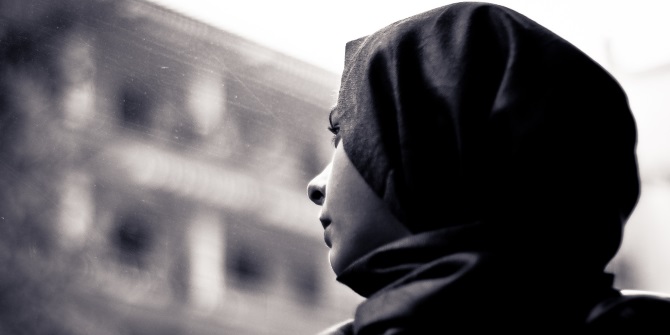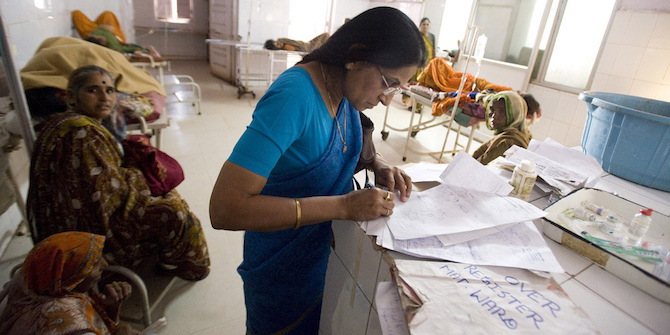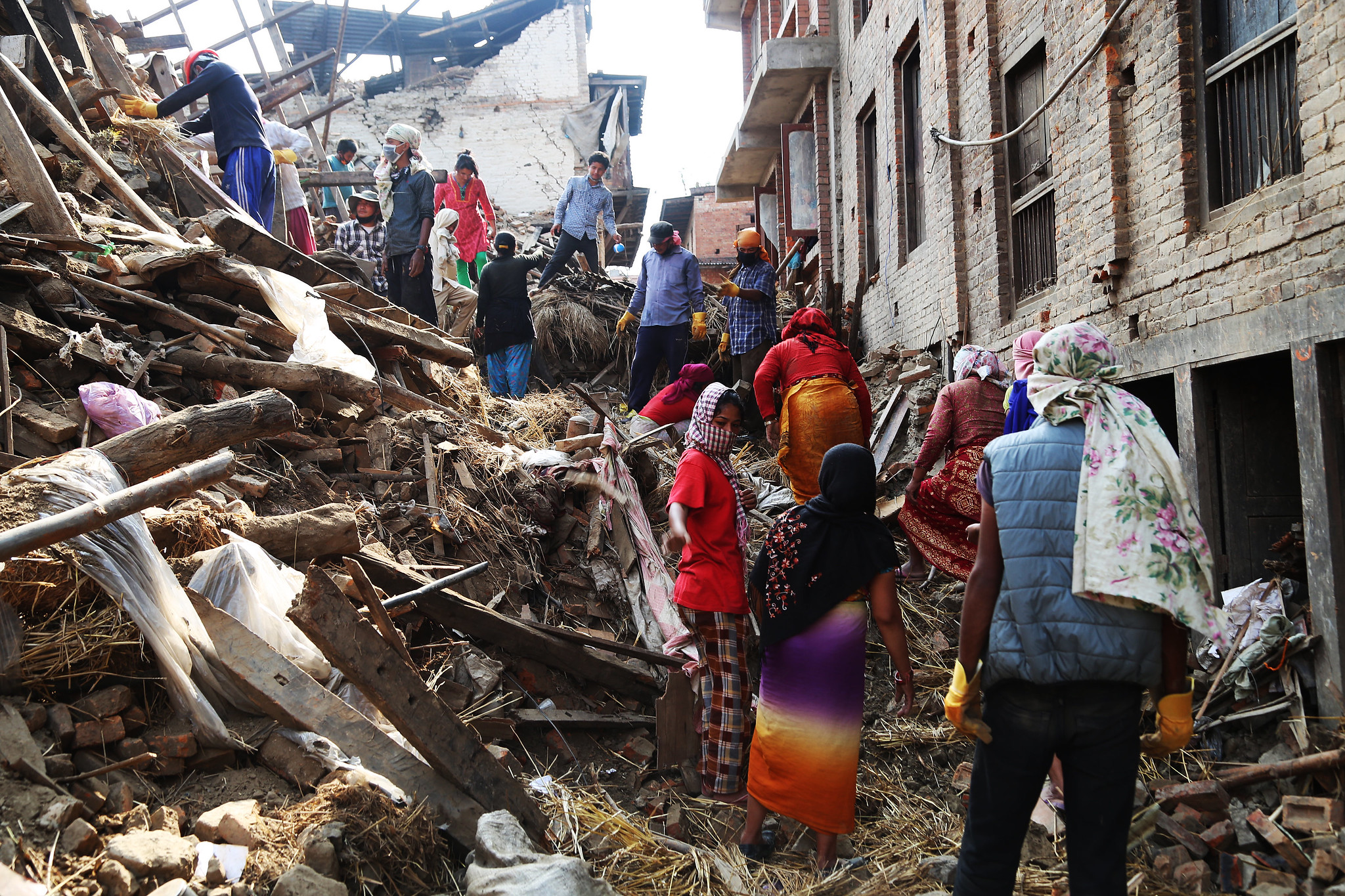 This week the Supreme Court banned triple talaq as a means of divorce among Muslims in India. Nida Kirmani welcomes the ruling as progress towards the protection of Muslim women’s rights within marriage, but writes that we must be mindful of how the debate has been framed. At a time when Muslims are facing increasing discrimination, there are those who are celebrating the decision to advance their own agendas, and will likely continue to try and co-opt debates around Muslim Personal Law.
This week the Supreme Court banned triple talaq as a means of divorce among Muslims in India. Nida Kirmani welcomes the ruling as progress towards the protection of Muslim women’s rights within marriage, but writes that we must be mindful of how the debate has been framed. At a time when Muslims are facing increasing discrimination, there are those who are celebrating the decision to advance their own agendas, and will likely continue to try and co-opt debates around Muslim Personal Law.
On August 22nd, the Indian Supreme Court passed a landmark decision with regards to the case of Shayanara Bano banning the controversial practice of triple talaq—instantaneous divorce of a Muslim woman by her husband after uttering (or in some cases writing or texting) the words ‘I divorce you’ three times. The practice of unilateral triple talaq has left many Muslim women across India in states of destitution and has increased their insecurity and vulnerability within their marriages. The current verdict is the most recent in a series of progressive rulings made by courts, including the landmark Shamim Ara case of 2002.
Activists have long been mobilising for the abolition of triple talaq. Ramachandra Guha, for example, traces the debate back to the 1960s, when Marathi writer Hamid Dalwai argued vociferously for an end to the practice. However, the struggle gained widespread attention in public debates mostly during the 1980s when the Shah Bano case was brought to the Supreme Court. This case, which centred around a Muslim woman’s right to receive maintenance after divorce, opened up a wider debate about Muslim women’s rights in the country, including the issue of triple talaq.
During this period, Muslim women activists were themselves rarely present. Rather, the discussion took place between various groups of men vying for power including political parties like the Congress and the BJP and religious bodies such as the All India Muslim Personal Law Board (AIMPLB). Even the women’s movement at that time was dominated by upper caste Hindu women with little representation from Muslim, Dalit or Christian women. Hence, they were unable to effectively argue for the rights of Muslim women without being seen as siding with the Hindu Right.
Since this time, Muslim women have themselves begun to organise for their own rights. The 1990s witnessed the emergence of two Muslim women-led networks, the Muslim Women’s Rights Network (MWRN) and the Bharatiya Muslim Mahila Andolan (BMMA) along with various NGOs across the country. The MWRN has since disbanded but members continue to be active in organizations such as the Bebaak Collective in Mumbai, and the BMMA has continued its efforts unabated. These activists have helped diversity and complicate the debate around Muslims women’s rights, which had hardly moved forward since the 1980s.
The rise of progressive Muslim voices also reflects the waning influence the AIMPLB—a body comprised of largely conservative religious scholars from various Islamic schools of thought. This body has historically been allowed to represent the Muslim community both by the state and the media despite the diversity that exists amongst Indian Muslims. The AIMPLB has turned triple talaq into a central identity marker for the Muslim community, arguing that this practice has existed since the advent of Islam and hence cannot be changed despite considering it ‘sinful’. This ignores the fact that many Islamic schools of thought and at least twenty Muslim-majority countries have actually legally banned this practice.
While there is no doubt that this decision is welcome, and while I am not arguing as some have that the decision is the work of vested political interests, one must be conscious of the way the debate is being co-opted and framed. As Nivedita Menon has argued, in the current political climate, the issue of Muslim Personal Law has become ‘a stick to beat Muslims with’ rather than a genuine call for women’s rights.
The proponents of Hindutva, including the RSS and the BJP, have long used the issue of Muslim women’s rights as a symbolic tool to prove ‘Muslim backwardness’, ignoring the sexism present across religious communities and religious personal laws in India. With the Shayanara Bano case as well, leaders of the BJP, including Yogi Adithyanath and Narendra Modi, have hailed this decision as a victory for women’s empowerment. Hence, it is important to be conscious of the way the case is being manipulated by different actors during a time when Muslims are increasingly the targets of violence, including the recent spate of brutal lynchings in the name of cow protection.
Hence, the focus on triple talaq in isolation is problematic. As has been pointed out by legal activists such as Flavia Agnes, Muslim women are not the sole victims of discrimination in India. She points to the discrimination present in Hindu laws as well with regards to marriage, which rarely become the focus of public debates in the same way as Muslim Personal Laws. The framing of Muslim women as particularly oppressed is misleading in a context where patriarchy is operating in multiple forms across religion and caste groups.
Furthermore, the Shayanara Bano decision came only one day after the same Supreme Court delayed the decision on whether the annulment of the marriage of a 24-year old woman who had converted from Hinduism to Islam and married a Muslim man in the state of Kerala should be upheld. The Court called for an investigation of whether the marriage was a case of ‘love jihad’—a term coined by the Hindu Right to refer to the forced marriage of Hindu women to Muslim men—thus legitimising this concept. While the Supreme Court has yet to take a final decision on this case, the very fact that the marriage of two consenting adults could be nullified by a High Court and not overturned immediately by the Supreme Court is a testament to the political climate in the country at the moment.
Hence, to be properly understood, the Shayanara Bano case must be analysed within the current political context. While this verdict and the debates leading up to it signal the opening up of space for progressive Muslim voices in India and a fragmentation of traditional male-dominated religious authority, and while the decision is a welcome step towards the protection of Muslim women’s rights within marriage, it comes at a time when Muslims in general are increasingly the targets of discrimination and violence. As was the case during the Shah Bano debates over three decades ago, it will be a major challenge in the coming weeks for Muslim women’s rights activists to avoid the co-optation of their struggle by proponents of Hindutva who are already scrambling to claim this as their victory. If this is allowed to happen, the verdict could prove more harmful in the long-run than helpful in advancing the cause of Muslim women’s rights.
Cover image: Supreme Court of India. Credit: Wikicommons CC SA 3.0
This article gives the views of the authors, and not the position of the South Asia @ LSE blog, nor of the London School of Economics. Please read our comments policy before posting.
About the Author
 Nida Kirmani is Associate Professor of Sociology in the Mushtaq Ahmad Gurmani School of Humanities and Social Sciences at the Lahore University of Management Sciences (LUMS). She has published widely on issues related to gender, Islam, women’s movements, development and urban studies in South Asia. Her book, Questioning ‘the Muslim Woman’: Identity and Insecurity in an Urban Indian Locality, which focuses on a Muslim neighbourhood in Delhi, was published in 2013 by Routledge. Her current research focuses on urban violence, gender and insecurity in Karachi. She can be contacted at nida.kirmani@lums.edu.pk.
Nida Kirmani is Associate Professor of Sociology in the Mushtaq Ahmad Gurmani School of Humanities and Social Sciences at the Lahore University of Management Sciences (LUMS). She has published widely on issues related to gender, Islam, women’s movements, development and urban studies in South Asia. Her book, Questioning ‘the Muslim Woman’: Identity and Insecurity in an Urban Indian Locality, which focuses on a Muslim neighbourhood in Delhi, was published in 2013 by Routledge. Her current research focuses on urban violence, gender and insecurity in Karachi. She can be contacted at nida.kirmani@lums.edu.pk.








These cases are not just in the developing nations but in the developed nations too.